It is hard to look at a Citroen 2CV and not break out in a smile. These are quirky classics, and while they aren’t a jet in a straight line, they offer a driving experience that is engaging and enjoyable. This 1956 model is in sound mechanical health, and it needs someone to treat it to a cosmetic refresh. The simplicity of construction means that they are the ideal candidate for a family project. If all of this sounds like a winning deal, you will find the Citroen located in Nevada City, California, and listed for sale here on eBay. While the bidding has been solid, it has only pushed the price along to $3,300. The reserve hasn’t been met, so there is still time to stake your claim if you find this to be a fascinating project. I have to say a big thank you to Barn Finder Larry D for referring the little French classic to us.
This 2CV will need some work, but I can’t spot anything that couldn’t be tackled in a home workshop or garage. The car is rust-free, and while it now wears some dings and dents, none of these are bad enough to justify panel replacement. One of the attractions of these as a project car is how easily the panels can be removed. That means that an owner doesn’t necessarily need to crouch in an uncomfortable position to work on a lower extremity. It’s simply a matter of removing the offending panel, and it can be tackled with comfort on a work-bench. The owner has recently powder-coated the wheels, so those won’t need to be touched. The convertible top has seen better days, and this will need to be replaced. That shouldn’t be a problem, because new ones can be found for under $300. When you consider that cost and the DIY possibilities with the panels and paint, whipping the exterior appearance into shape would seem to be a cheap proposition.
The Citroen’s interior will also require some work, but once again, parts are readily available and cheap. A cautious owner can locate all of the upholstery and necessary hardware to get the seats right for under $500, while $90 will put new rubber mats on the floor. If the buyer is not worried about originality, they might also choose to make their own custom covers for the seats. Anyone who can measure and sew would be able to do this, and that opens up a whole world of possibilities when it comes to the question of materials and colors. If the exterior is repainted in the original Blue, a set of covers in the French Tricolour (or Tricolore) would be both distinctive and quite patriotic. Well, it’s a thought, anyway. The owner might choose to paint the wheel and fit a wrap or send it out to be powder-coated. With those tasks tackled and the painted surfaces refreshed, the interior could look pretty stunning.
The owner doesn’t provide any engine photos, but he does provide plenty of information on the car’s mechanical state. The engine bay is home to a 425cc air-cooled twin that pumps out a heady 14hp. All of those rampant French ponies find their way to the front wheels via a 4-speed manual transmission. With such a modest power output, that little four will not allow the 2CV to threaten any muscle cars on the ¼ mile. That journey will take 32.5 seconds, and if you keep the foot buried, it will find its way to 45mph. It’s a good thing that the car tips the scales at a mere 1,125lbs because if it weighed much more, there’d be glaciers that moved faster than it! The reality with these older 2CVs is that they are not fast, but they are entertaining and quite robust. Some examples have seen military duty in locations like Africa, and they have performed with few if any, problems. The owner of this one has recently rebuilt the brakes. He has also treated it to new plug wires, a tune-up, new 15″ tires, and a service. It is said to run and drive well, and it seems that the drivetrain is one aspect of the Citroen that the buyer will be able to ignore.
The Citroen 2CV is not a car that will appeal to every enthusiast, but these cars have developed a strong following. It was initially produced to get the French population mobile following the end of World War II. It managed to do this with enormous success, and by the time production ended, more than 3.8 million cars had been built. This one is a long way from perfect, but it is a solid and rust-free classic that would suit the sort of person who likes hands-on projects. It would also make a wonderful family project, and the entire clan would have something to enjoy once the work is done. It is possible to buy a 2CV for well under $10,000, but an excellent example from this era will command prices beyond $15,000. Depending on where the reserve has been set, there is no reason why this couldn’t remain a financially viable project. However, sometimes the financial viability isn’t the primary concern. Once restored, this 2CV offers its owner a world of enjoyment, and no one can place a price on that.
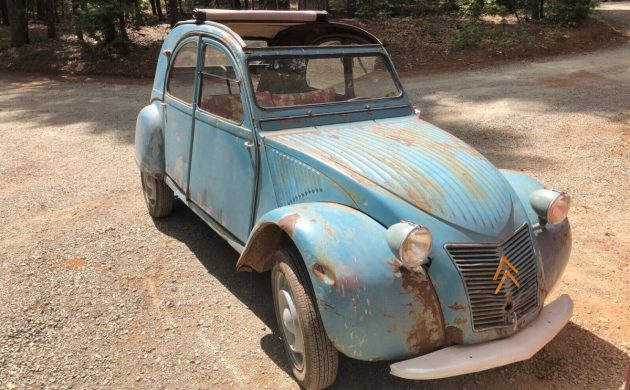
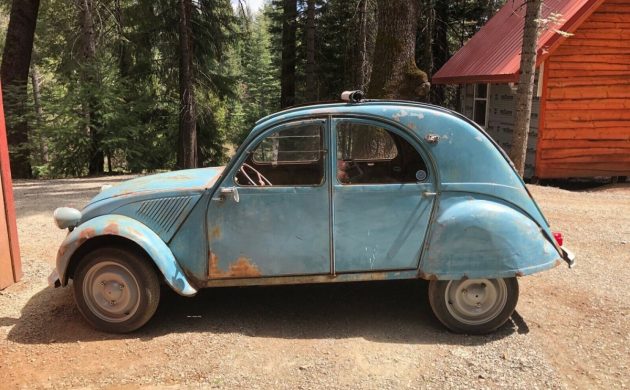
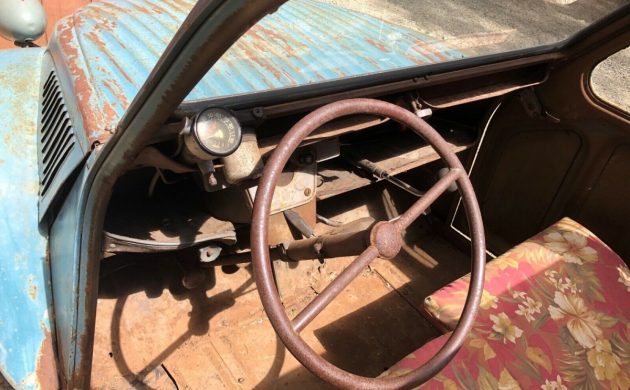
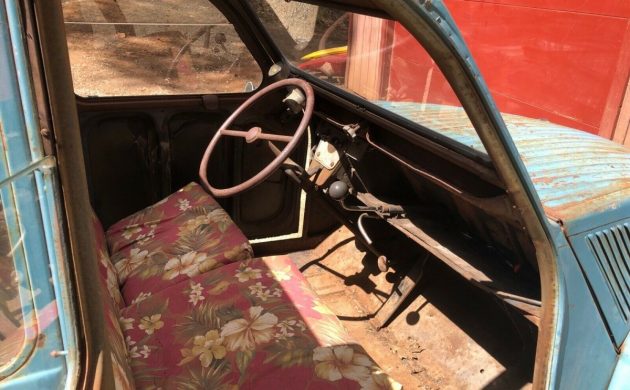
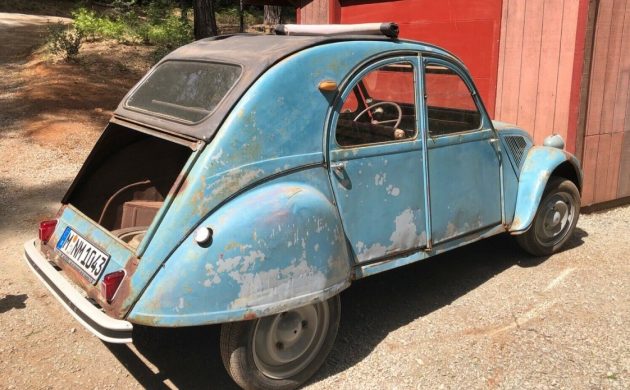





Zees ees amazing, no ?
oui!
Just be ready to shift the 4-speed on dash, not on the tree. Fun but if you are not familiar, it can take a few miles to adjust. Corners taken at speed and these have a prodigious LEAN but good grip and handling. Good opportunity if it stays low and reserve commensurate.
Back in 1976 our family vacationed in Ireland, where my Dad was born and raised. My cousin had one of these cars and insisted I drive it. As if the right hand steering weren’t freaky enough, the shift lever going straight into the dash needed lube and sounded worse than fingernails on a chalkboard! LOL, I vividly remember that sound.
I never could understand this. Ron Howard had a 58 Impala and Dreyfus had one of these.
A superb movie and a benchmark for all of us lucky enough to experience the early ’60s as young adults. Then came that awful day in November 63 and a pall was cast on the remainder of that decade with Vietnam, more assassinations riots and the like.
aih 1990
Leave the bodywork as it is, make sure that the chassis and toeboard area is ok, fit a parallel-port 602 from an Ami so it looks right – and thrash it senseless. The 602’ll get you 70 mph.
Matt’s soft tops will do you a roof.
An odd looking thing, but classically French. I’m not sure what is more basic, this, or that POS Jeep I looked at. They actually handle quite well, and 2CV races are very popular in Europe. I always wondered why French cars had such tall roofs, well, ( in my best Cliff Klaven voice) I read, these were used as police cars and it allowed the officer(s) to keep their tall hats on. Again, fine for the back alley’s of Europe, but I-70, not so much.
A reserve on this? Come on. Sorry, I’m constantly reminded what a joke this car hobby has become, and even more upset after looking at that Jeep( she wanted $5g’s, claimed a rebuilt motor( 4 cyl) and it had a miss, oh. that never did that before, she said, mm-hmm) and unfortunately, this site seems to deal with nothing but. To be perfectly honest, in all the time I’ve been here ( and complaining) I don’t remember one post that I thought was a good deal. I’m sure I’m pixxing a lot of people off with my views, and I apologize for that, maybe it’s time to move on. Knitting anyone?
European 2CV racing means that the likes of me get to take part in a 24hr race at Spa!
Hmmmm This is a site about barn finds (go figure) and survivor cars. If you’re looking for classifieds, there’s Facebook marketplace, FeeBay, Craigslist and such. If you’re looking for an interesting story about a long forgotten car, or one that has survived somehow over decades there are often such articles here.
To be fair, when you’re always looking for ‘new and perfect’ at the ‘old and junky’ price, you’re pretty much bound to be constantly disappointed.
Easy project. My favorite oxymoron. :)
“Easy” and “French car” are contradictory terms.
So rare to see an old 2CV that hasn’t been messed with. According to the chassis number this is one of the last -56 2CV AZ which was the “luxury” version that came with the new larger 425 cc engine (12 hp – not 14!) and the convenient “traffic clutch”. (A centrifugal clutch that allows you to change gears without using the clutch pedal somewhat similar to the freewheel on an old Saab or DKW) By -57 they got an air vent for the windshield which isn’t there on this car. This car does however have the larger rear window from the -57 but that would get swapped out with the top.
You might think it’s missing the trunk lid, but for these early 2CV it was just the fabric top that extends all the way down to also cover the trunk.
I saw a movie with one of these Beind drives aggressively (relative term) and I have never seen so much body roll in my life, it was amazing the body stayed on!
LOL, I had a ’74 VERY rusty Datsun pickup. On sharp curves the cab would lift 3-4″. Drive train was excellent, wish I still had it.
Another example of “there’s an a$$ for every seat”
A birth year car I could actually afford.
LOL, I’d rather have a birth year ’57 Chevy half ton.
While in Belgium a few years back, we visited a small village where the local flower shop had decorated one of these (restored nicely) as the lead car in a wedding procession. It set the tone beautifully! -kent
Just finishing a restoration of a ‘56 AZ. Mine was a rust bucket needing a new chassis, new body pieces, etc. Good news is that all that stuff is available. Be aware there are lots of differences between the early cars and the later 602cc cars. Everything is available for the later cars. The early ones, not so much.
It is IMPOSSIBLE to roll one of these if you’re going forwards. Backwards is another matter altogether. Top Gear tried out. There’sa YouTube video about it!
…unless you accidentally clip a kerb…!
surprised no mention of the Blond !! shame on you guys !!!LOL
Being a really early car, this one most likely has the inertia dampers, one on each wheel arm. They are really ingenious, being a completely sealed closed steel cylinder about 2 inches in diameter attached to the arm behind the brake backing plate. Inside is a large steel slug, which slides up/down on a central rod fixed to top & bottom. There is nothing inside but either air or possibly nitrogen to prevent rust. The steel slug is free to move, but has to push the air past itself to move up or down the rod. So it sees the friction of the air, being compressed in each direction, and this damping action is tuned very carefully to achieve max damping of the wheel when it hits a bump, yet there is no fluid as in a hydraulic shock absorber, and it cannot wear out. It can’t leak as it is sealed, there are no internal parts to wear unless possibly the slug wears its center hole larger, or narrows the rod, to allow air to pass more freely from one side to the other of the slug.
These inertia dampers are just another example of how the French engineers throw away the book, start their engineering goals from scratch using fundamental laws of physics, and outsmart everyone else. Yes the cars roll in corners like a drunken sailor, but very seldom turn turtle, due to their extremely low center of gravity. Combine that with the very long wheel travel and very smart damping, and you have a car whose speed around a corner can be surprisingly high, scare the pants off the novice, and still feel like they’re on rails. The secret is, as far as I can figure, is that, the car’s long suspension travel allows the body to roll a great deal before the inertial mass of the very light upper body structure begins to lift the inside wheels off the ground, and by the time the roll limit is reached, the car has finished the corner and so carries on as normal. I have personally driven my ’64 3CV truckette over freestanding 8 inch thick railroad ties in a parking lot, with 3 of us aboard, and barely felt the “bump” of those monster RR ties! The ingenious horizontal dual spring cylinders connecting front wheels to rear is a marvel of creative engineering, achieving comfort yet roadholding better than many modern cars. And very few owners of these tin buckets even know that each of those huge boomerang tubular suspension arms is connected to the body platform NOT by cheapo rubber bushings, but get this folks – Tapered Rollerbearings – how’s that for trick? No rubber bushing I know of could stand the extreme rotary motion of the 2CV arms without shearing a conventional rubber bushing to pieces, and those long arms stay perfectly aligned literally for the life of the car, needing near zero maintenance, because the platform is like a machine tool – solid as a rock.
If anyone out there knows of any other car brand which mounts its suspension arms on rollerbearings, let me know – I would be truly surprised.
Fantastic info Ken, Thanks!!!!
There was a car in the picture of the blond???
Fun Fact … These cars were designed to have as few moving parts as possible, The little speedometer in the corner of the windshield has a gearbox on the back that when engaged drives the windshield wipers ! The faster you go , the faster the wipers go and yes, when you come to a stop, the wipers stop. No electric motor, no vacuum motor, Just the driving torque from the speedo cable. No heater motor either, the cooling fan on the air cooled engine just blows air over the exhaust manifolds, just like in a VW Beetle.
I like the 2CV’s !! I want this !!
But I am spineless !!
I should buy it to add to my other unfinished British projects and be a man and say…
Honey I didn’t know my bid was the last one and move my clothes out to the garage.
No guts, No glory
In 2006, my computer was slow and as a result I got in a last nanosecond bid on a Citroen 2CV Dyane (an updated variant of the original) and won. “Honey, look what I won,” I blurted out. “Won?” she replied.
“You mean it’s free?” ,
“Eh, no not exactly.”
“Oh you won the right to buy it, or actually the obligation to buy it.”
“Sweetheart,” I answered “We’re thinking again,”
I still have the scar